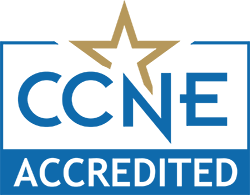Master of Science in Nursing Online Degree Program
Build Career-Ready Nursing Leadership Skills
- Apply By: 02/23/2026
- Start Class: 03/16/2026
In two years, the Master of Science in Nursing (M.S.N.) online program prepares registered nurses to pursue administrative roles as effective, ethical leaders in health care. The industry-leading Benedictine University M.S.N. online curriculum aligns with the American Association of Colleges of Nursing (AACN) outcomes for master’s prepared nurses, and the Nursing Leadership concentration ensures that you’re ready to level up your career.
Program Highlights
- Accredited by the Commission on Collegiate Nursing Education (CCNE)
- Concentration in Nursing Leadership
- No application fee
Develop Specialized Skills in Nursing Leadership
The Nursing Leadership concentration of the online M.S.N. prepares you to hold accountability for patient care across a broad spectrum of positions. You’ll gain expertise in collaboration, organization, communication, and critical and strategic thinking. You’ll be able to manage a department within a large health care organization, manage a health care clinic, oversee business aspects of nursing departments and develop service lines.
M.S.N. Online Degree Program Details
Curriculum
Explore the Curriculum for Our Online M.S.N. Program
36 Credit Hours
10 Courses
While seeking our CCNE-accredited M.S.N. degree online, you will complete foundation courses covering evidence-based nursing practice, health promotion, population health, quality and safety, health care policy and advocacy. After that, you will complete the Nursing Leadership concentration to develop competencies for your desired career path.
Course Highlights
- Complete an on-ground practicum in a real clinical setting.
- Meet the practicum requirement in a clinical site near your home.
- Conduct a capstone project focused on identifying and addressing a nursing challenge.
Admissions Requirements
Apply Today at No Cost
Application Deadline February 23, 2026
Start Date March 16, 2026
We offer a simple admissions process for students interested in earning a Master of Science in Nursing online. There are no application fees or testing requirements, making it easier to get started.
| Online Application Form | Apply Now |
|---|---|
| Degree and Minimum GPA | Bachelor of Science degree in Nursing (B.S.N.) from a regionally accredited college or university with a minimum cumulative GPA of 2.75 on a 4.0 scale. |
| Transcripts | Official sealed transcripts from all previously attended colleges and universities. |
| Transfer Credits | After acceptance, students can apply to waive up to 12 credit hours of courses. Courses must have been completed with a “B” grade or higher in the past five years from a regionally accredited school with equivalent curriculum. |
| Health and Safety Requirements | Accepted students must meet health and safety requirements, including selected immunizations and screening tests, CPR certification, flu shot and health insurance. Additional requirements may be necessary as specified by the agency at which the clinical experiences are conducted. Documentation is submitted to a Department of Nursing and Health designated vendor. A one-time fee is paid by the student upon activation of the document tracking account. Submission and approval of required documentation must be completed in accordance with established dates. |
| Additional Requirements |
|
International Admission Requirements
Benedictine University’s online programs enable you to earn a degree from a respected American university without leaving home. With students and graduates from all 50 U.S. states and more than 16 countries, Benedictine provides you with abundant opportunities for networking as a student and after graduation through our alumni association and online directory of graduates.*
| Foreign Transcript Evaluation | A three-year bachelor’s degree program must be deemed equivalent to a four-year U.S. bachelor’s degree program by Educational Credential Evaluators (ECE), World Education Services (WES) or Educational Perspectives in order to qualify for admission to a graduate program. |
|---|---|
| English Language Proficiency | International students applying to graduate programs must meet one of the following requirements on a proficiency exam:
|
* For international students, on-ground clinical courses must be completed in the United States.
Tuition & Aid
Review the Tuition for Earning Your M.S.N. Online
Calculate your cost for attending BenU Use our tuition calculator to help you estimate your total tuition costs.
Affordable, flexible and designed to meet the challenges facing the nursing profession, our online M.S.N. program enables you to transform your nursing career and rise to the evolving demands of health care. After you request information, be sure to ask your admissions counselor about financial aid options that make it more cost-effective to acquire your master’s degree in nursing online.
| Cost per Credit Hour | $670 |
|---|---|
| Total Number of Credit Hours | 36 |
| Total Estimated Tuition | $24,120 |
| Additional Fees | $125 student services fee per semester |
| Other Costs to Budget For | The estimated tuition cost does not include factors like textbooks or other expenses. |
Proud to Support Our Military Students
Benedictine University is grateful for the service of the men and women of the U.S. military. We participate in the Yellow Ribbon program and offer a Military Scholarship to active-duty and veteran service members. Additionally, our admissions team can help you make the most of the education benefits available through the Department of Veterans Affairs.
We strive to provide valuable returns as you progress through your online program and career. To make your program cost-effective, we can help you explore financial aid options, scholarships, military benefits and more. Plus, learn how tuition reimbursement programs help you save money while earning a career-aligned degree.
Tuition DetailsCCNE-Accredited M.S.N. Online
The Master’s Degree Program in Nursing at Benedictine University is accredited by the Commission on Collegiate Nursing Education, 655 K Street NW, Suite 750, Washington, DC 20001, 202-887-6791.

Dual M.S.N./M.B.A. Option Available
Complete two degrees at once with our Master of Science in Nursing/Master of Business Administration (M.S.N./M.B.A.) Dual Degree online program. You can become a servant leader capable of guiding health care organizations through challenging times. The Dual M.S.N./M.B.A. is ideal for nurses wanting to advance in administration with additional critical thinking, problem-solving and decision-making skills.
Read More About the M.S.N./M.B.A. Dual Degree.

An M.S.N. Takes Your Nursing Career to the Next Level
Nurses with their M.S.N. gain an advantage in the job market, especially for leadership positions. They also boost their salary potential, as nurses with M.S.N. degrees earned about 8% more on average than nurses with B.S.N. degrees as of January 2025.1,2
While positions for M.S.N. degree holders vary widely, some of the most common job titles for an M.S.N. with a concentration in Nursing Leadership are nurse leaders, nursing directors, clinical nurse managers and clinical services directors.
Explore CareersAdvanced Careers in Nursing
Director, Nursing $100,887 average base salary3
Clinical Nurse Leader $91,458 average base salary4
What You’ll Learn
This program appeals to students interested in completing a B.S.N. to M.S.N. program online. Our expert faculty will help you develop advanced competencies for the next phase of your career. After obtaining your master’s degree in nursing online with Benedictine, you’ll have qualifications for increasing your earning potential and opening the door to new career options.
Program Outcomes
Students in the Master of Science in Nursing Program will achieve the following student learning outcomes (SLO):
Integrate nursing knowledge and science and relevant science-based theories as the basis for advanced nursing practice.
University SLO: 1. Disciplinary Competence and Skills
Critically appraise existing research to determine and implement the best evidence to advance the scholarship of nursing.
University SLO: 5. Analytical Skills
Utilize leadership practices to advance healthcare policy, promoting a culture of safety and delivering quality cost-effective care.
University SLO: 8. Stewardship
Integrate information and communication technologies to deliver quality healthcare services in accordance with best practices and professional and regulatory standards.
University SLO: 4. Information Fluency
Engage in interprofessional partnerships focused on the improvement of patient and population health outcomes in an ethical, legal, and fiscally responsible manner.
University SLO: 7. Civic Engagement and Social Responsibility
Communicate effectively to promote person-centered care and enhance the health and well-being of persons.
University SLO: 3. Communication Skills
Engage in advocacy initiatives to support and improve equitable population health outcomes.
University SLO: 6. Global Awareness and Cultural Awareness
Complete a master’s-level quality improvement project demonstrating synthesis of coursework and advanced nursing practice.
University SLO: 2. Critical and Creative Thinking Skills
Advance leadership and professional nursing identity through self-reflection, self-care, and a commitment to lifelong learning.
University SLO: 9. Personal Development
Follow Our Faculty to the Forefront of In-Demand Fields
Benedictine University’s faculty members bring tremendous professional experience to the classroom. As distinguished instructors and industry leaders, they commit to publishing new findings and pioneering new possibilities in their fields. Thanks to our small student-to-faculty ratio, you will receive personal support throughout your online program.

Alison Ridge, Professor, Graduate Program Director and Clinical Coordinator
Faculty Spotlight: Alison Ridge, D.N.P., RN, CNE
Dr. Ridge has been on the faculty at BenU since 2012. She has extensive online, on-ground and clinical teaching expertise and has taught all levels of nursing students.
Her philosophy of teaching focuses on partnering with students to promote their success and that mutual learning occurs. Her professional nursing practice background includes care of adults and older adults with mental health issues. Additionally, she has expertise working in the community delivering health promotion programs. Her scholarly work focuses on caring in student and faculty interactions, supporting adjunct faculty and reflective practices of staff nurses to address human suffering.
Education
- D.N.P. – Systems Leadership, Rush College of Nursing
- M.S.N. – Psychiatric Nursing, Rush College of Nursing
- Certified Nurse Educator (CNE)
Professional Associations
- American Psychiatric Nurses Association
- Sigma Theta Tau
- American Association of Colleges of Nursing
- National League for Nursing
Related Programs
Frequently Asked Questions
Explore our frequently asked questions for in-depth answers. If you don’t find what you’re looking for, reach out to us.
Students of the M.S.N. online program are required to take one class per 8-week session, which would be considered part-time. Depending on the concentration you choose, you will be required to complete either 12 or 13 courses over the course of two years or two years and eight weeks.
To align with the demanding schedules of today’s professionals, Benedictine’s M.S.N. online program offers three opportunities to start courses per year in January, May and August. Contact a program manager at (866) 295-3104 for the next start date.
You must have an earned bachelor’s degree in nursing from a regionally accredited college or university, with a minimum cumulative undergraduate GPA of 2.75.
After acceptance, students can apply to transfer up to 12 credit hours. Courses must have been completed with a grade of “B” or higher taken in the past five years from a regionally accredited school with equivalent content to courses in the Benedictine M.S.N. curriculum.
Many Magnet hospitals now require a percentage of nurses on staff to have earned master’s degrees. In turn, even non-Magnet hospitals are adopting this requirement in the hopes of achieving Magnet status and improving patient care. With your advanced nursing degree, you’ll have a clear advantage in competing for a job and positioning yourself for advanced nursing careers.
Yes. Students can set up a telephone appointment to speak with an advisor whenever assistance is needed.
Sources
- Payscale. “Bachelor of Science in Nursing (BSN) Degree”. December 11, 2024. Retrieved February 28, 2025, from https://www.payscale.com/research/US/Degree=Bachelor_of_Science_in_Nursing_(BSN)/Salary.
- Payscale. “Master of Science in Nursing (M.S.N.) Degree.” July 29, 2024. Retrieved February 28, 2025, from https://www.payscale.com/research/US/Degree=Master_of_Science_in_Nursing_(MSN)/Salary.
- Payscale. “Average Salary, Nursing Director Salary.” January 10, 2025. Retrieved February 28, 2025, from https://www.payscale.com/research/US/Job=Director%2C_Nursing/Salary.
- Payscale. “Average Clinical Nurse Leader Hourly Pay.” September 2, 2024. Retrieved February 28, 2025, from https://www.payscale.com/research/US/Job=Clinical_Nurse_Leader/Salary.
